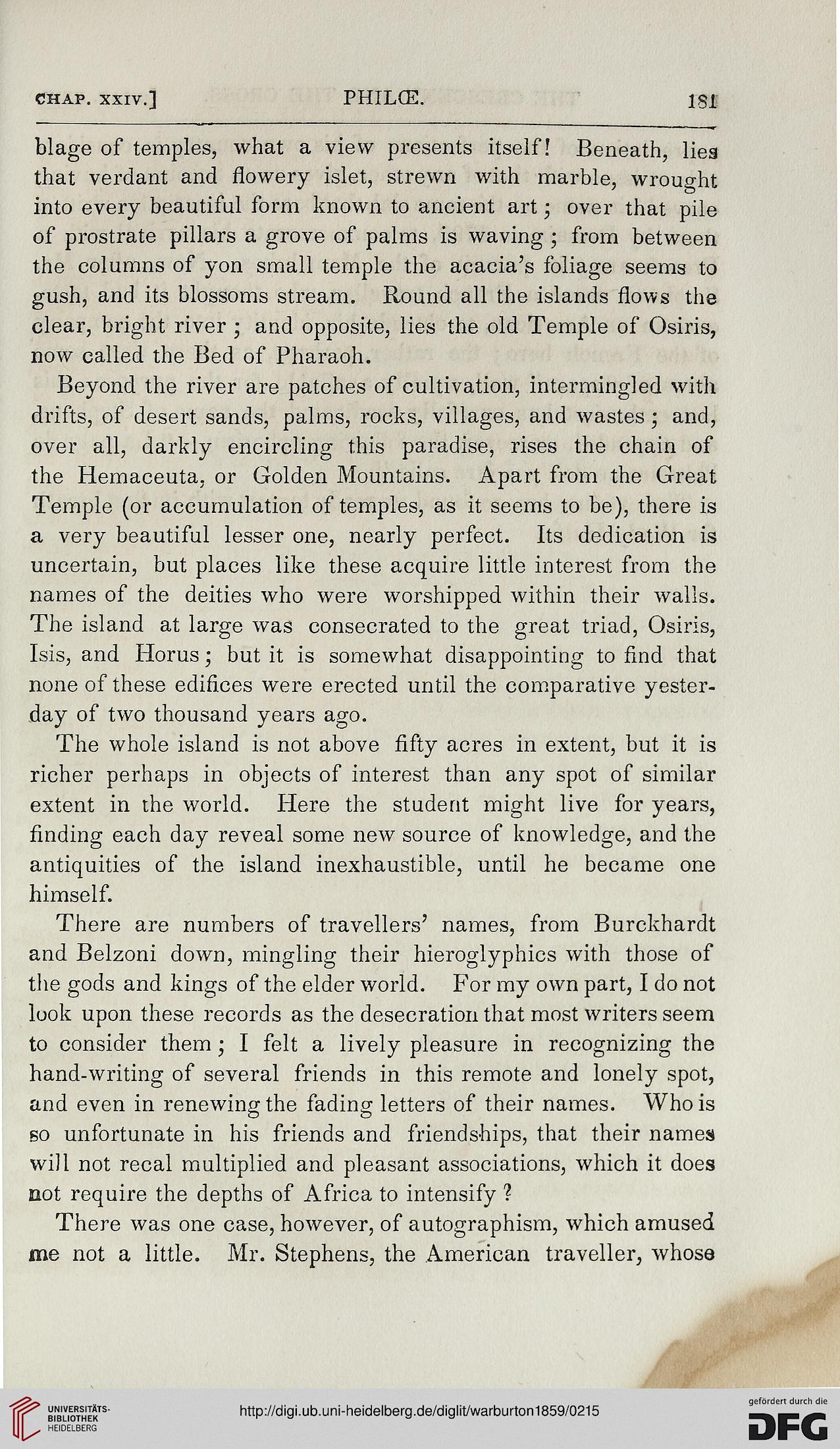chap, xxiv.] PHILCE. 1S1
blage of temples, what a view presents itself! Beneath, liea
that verdant and flowery islet, strewn with marble, wrought
into every beautiful form known to ancient art; over that pile
of prostrate pillars a grove of palms is waving ; from between
the columns of yon small temple the acacia's foliage seems to
gush, and its blossoms stream. Round all the islands flows the
clear, bright river ; and opposite, lies the old Temple of Osiris,
now called the Bed of Pharaoh.
Beyond the river are patches of cultivation, intermingled with
drifts, of desert sands, palms, rocks, villages, and wastes ; and,
over all, darkly encircling this paradise, rises the chain of
the Hemaceuta, or Golden Mountains. Apart from the Great
Temple (or accumulation of temples, as it seems to be), there is
a very beautiful lesser one, nearly perfect. Its dedication is
uncertain, but places like these acquire little interest from the
names of the deities who were worshipped within their walls.
The island at large was consecrated to the great triad, Osiris,
Isis, and Horus; but it is somewhat disappointing to find that
none of these edifices were erected until the comparative yester-
day of two thousand years ago.
The whole island is not above fifty acres in extent, but it is
richer perhaps in objects of interest than any spot of similar
extent in the world. Here the student might live for years,
finding each day reveal some new source of knowledge, and the
antiquities of the island inexhaustible, until he became one
himself.
There are numbers of travellers' names, from Burckhardt
and Belzoni down, mingling their hieroglyphics with those of
the gods and kings of the elder world. For my own part, I do not
look upon these records as the desecration that most writers seem
to consider them ; I felt a lively pleasure in recognizing the
hand-writing of several friends in this remote and lonely spot,
and even in renewing the fading letters of their names. Who is
go unfortunate in his friends and friendships, that their names
will not recal multiplied and pleasant associations, which it does
not require the depths of Africa to intensify 1
There was one case, however, of autographism, which amused
me not a little. Mr. Stephens, the American traveller, whose
blage of temples, what a view presents itself! Beneath, liea
that verdant and flowery islet, strewn with marble, wrought
into every beautiful form known to ancient art; over that pile
of prostrate pillars a grove of palms is waving ; from between
the columns of yon small temple the acacia's foliage seems to
gush, and its blossoms stream. Round all the islands flows the
clear, bright river ; and opposite, lies the old Temple of Osiris,
now called the Bed of Pharaoh.
Beyond the river are patches of cultivation, intermingled with
drifts, of desert sands, palms, rocks, villages, and wastes ; and,
over all, darkly encircling this paradise, rises the chain of
the Hemaceuta, or Golden Mountains. Apart from the Great
Temple (or accumulation of temples, as it seems to be), there is
a very beautiful lesser one, nearly perfect. Its dedication is
uncertain, but places like these acquire little interest from the
names of the deities who were worshipped within their walls.
The island at large was consecrated to the great triad, Osiris,
Isis, and Horus; but it is somewhat disappointing to find that
none of these edifices were erected until the comparative yester-
day of two thousand years ago.
The whole island is not above fifty acres in extent, but it is
richer perhaps in objects of interest than any spot of similar
extent in the world. Here the student might live for years,
finding each day reveal some new source of knowledge, and the
antiquities of the island inexhaustible, until he became one
himself.
There are numbers of travellers' names, from Burckhardt
and Belzoni down, mingling their hieroglyphics with those of
the gods and kings of the elder world. For my own part, I do not
look upon these records as the desecration that most writers seem
to consider them ; I felt a lively pleasure in recognizing the
hand-writing of several friends in this remote and lonely spot,
and even in renewing the fading letters of their names. Who is
go unfortunate in his friends and friendships, that their names
will not recal multiplied and pleasant associations, which it does
not require the depths of Africa to intensify 1
There was one case, however, of autographism, which amused
me not a little. Mr. Stephens, the American traveller, whose




